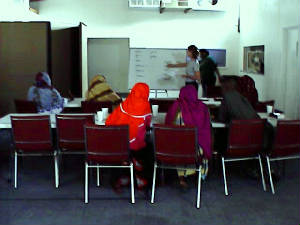|
Spending and Credit
- Develop, monitor and evaluate a personal budget.
- Discuss opportunity costs and trade-offs on budget implementation.
- Identify and discuss the social and personal consequences of not
following a budget.
- Compare and evaluate various tools available for keeping track of
budgets (e.g. envelope systems, computer programs, and paper tracking).
- Demonstrate knowledge of financial transactions, checking and savings
accounts and associated financial services.
- Demonstrate how to manage a checking account.
- Evaluate the impact
of major purchases on budgeting (e.g. automobile, housing).
Saving and Investing
Compare the risk, return, liquidity, and costs for savings
and investments.
Explain the effects of inflation on savings and investments.
Describe the concept of the time value of money.
Analyze the relationship between risk and return.
Describe appropriate financial products for different financial
goals (e.g., savings accounts, stocks).
Consumer Protection
- Explain the purposes and features of consumer protection laws, agencies
and sources for assistance.
- Describe ways to avoid "Identity Theft" and fraud (e.g., keep Social
Security numbers secure, properly dispose of outdated documents).
- Explain the importance of understanding financial contracts (e.g.,
disclosure information, grace period, payment penalties, method of interest calculation).
- List possible actions a consumer can take in response to excessive
debt and collection practices (e.g., sell assets, negotiate a repayment schedule).
- Describe ways to avoid financial scams and schemes designed to defraud
consumers (e.g., Ponzi and pyramid schemes, affinity fraud).
|
Somali community development of utah has developed best
curriculam of financial literacy program is simple and easer way refugees can understand and learn about financial management
and more becoming well informed monetary decisions, realizing a greater potential for personal wealth, and future economic
goals.
Interested please call to register at 801-433-0448 next session will
be start in january 2006 and normally will be limited upto15 students.

General Financial Literacy program includes following subjects
Income
- Identify sources of income (e.g., wages, investments, self-employment
- Compare common employee benefits (e.g., insurance, leave, retirement).
Compare income to the cost-of-living in various geographical areas. Analyze how economic conditions affect income
Money management
- Introduction of money management, financial institutions, services
offered by the various financial institutions, advantages and disadvantages of each type of institution. The process of opening
up a check account, writing checks, how to reconcile a bank account, and steps to take if you find a problem with your bank
statement
- Review the responsibilities people have of their own finances,
consequences of poor money management, excessive debt, and bankruptcy. Identification of available sources to help individuals
who need financial services, the process necessary to correct ones financial woes and how to regain financial stability
Risk Management
- Identify common types of insurance (e.g., automobile, health, homeowners,
renter’s, life, long term disability) and their terminology (e.g., term, whole life, deductible, premium, grace period).
- Describe how insurance and other risk-management strategies protect
against financial loss.
- Discuss insurance needs at various life stages.
- Identify the importance of estate planning (wills, trusts).
Discuss the consequences of being under-insured
|

